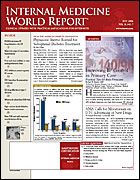Publication
Article
Internal Medicine World Report
Are Marijuana Users at Risk of Lung Cancer?
Author(s):
From The American Thoracic Society
SAN DIEGO—In contrast to previous evidence that suggested smoking marijuana predisposes to lung cancer, a large, population-based, case-control study found no such association, even among long-term, heavy users, according to a report presented at the American Thoracic Society annual meeting.
Biochemical and preclinical studies suggested that marijuana smoke might increase risk for lung cancer. Heavy habitual use has been shown to produce an accelerated, malignant change in lung tissue in culture and cause molecular changes in bronchial biopsy tissue grown in the laboratory.
Marijuana smoke contains several known carcinogens. Smoking marijuana deposits 4 times as much tar in the lung as smoking a similar quantity of cigarettes. In addition, marijuana smoke is not filtered, and the leaves are more loosely packed than tobacco, allowing more particles to be delivered to the lungs.
Most epidemiologic studies of long-term marijuana users have been limited by small numbers and possible bias, said Donald Tashkin, MD, professor of medicine, University of California Los Angeles School of Medicine. He and his colleagues conducted a population-based, case-control study in individuals aged 18 to 59 years with cancer. Controls were matched based on age, sex, and neighborhood of residence (which served as a surrogate for socioeconomic status and exposure to pollutants). Face-to-face interviews were completed in 611 lung cancer cases and 1040 controls.
Data collected included lifetime use of marijuana (measured in joint-years); use of tobacco, alcohol, and other drugs; diet; occupation; family history of lung cancer; and exposure to secondhand tobacco smoke. Logistic regression analysis was used to estimate the effect of marijuana on lung cancer risk.
Marijuana smokers were not at increased risk of lung cancer compared with controls, but persons who smoked ≥2 packs of cigarettes each day had a 20-fold increased risk. “We found no association, not even a suggestion, of a positive association of marijuana use—even heavy, long-term use—and lung cancer, after controlling for tobacco smoking and other potential confounders,” said Dr Tashkin.
James Jett, MD, of the Mayo College of Medicine, Rochester, Minn, commented: “This is a large, well-done, case-control study. The results moved me from thinking that there was an association of marijuana smoking with lung cancer to a more neutral position that there is evidence on both sides.”
However, the epidemiologic data remain conflicted. “There is a case-control study from Tunisia now in press that shows marijuana use does increase the risk of lung cancer,” said Dr Jett. He pointed out that a cancer–marijuana link could emerge as baby boomers age and that a large percentage (60%) of the marijuana smokers in Dr Tashkin’s study also smoked cigarettes.
Dr Tashkin theorized that the toxic substances in marijuana smoke may affect an individual’s susceptibility to lung cancer.






